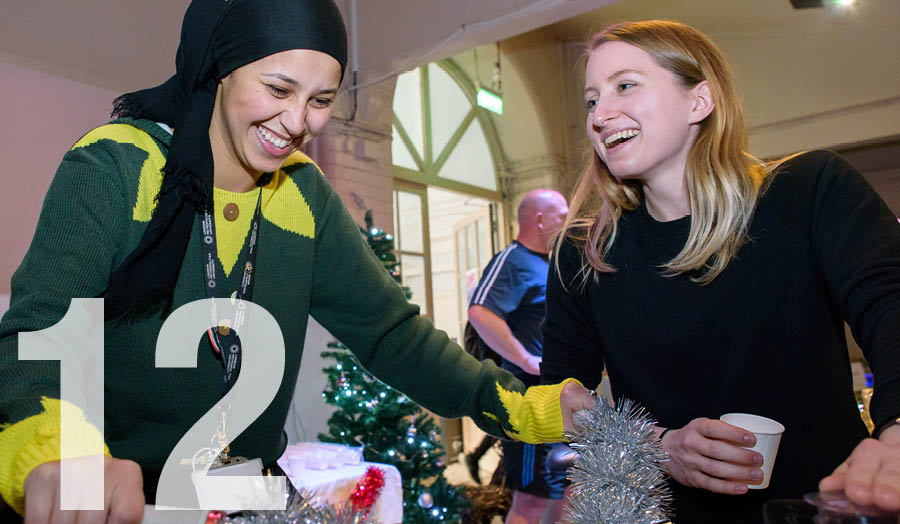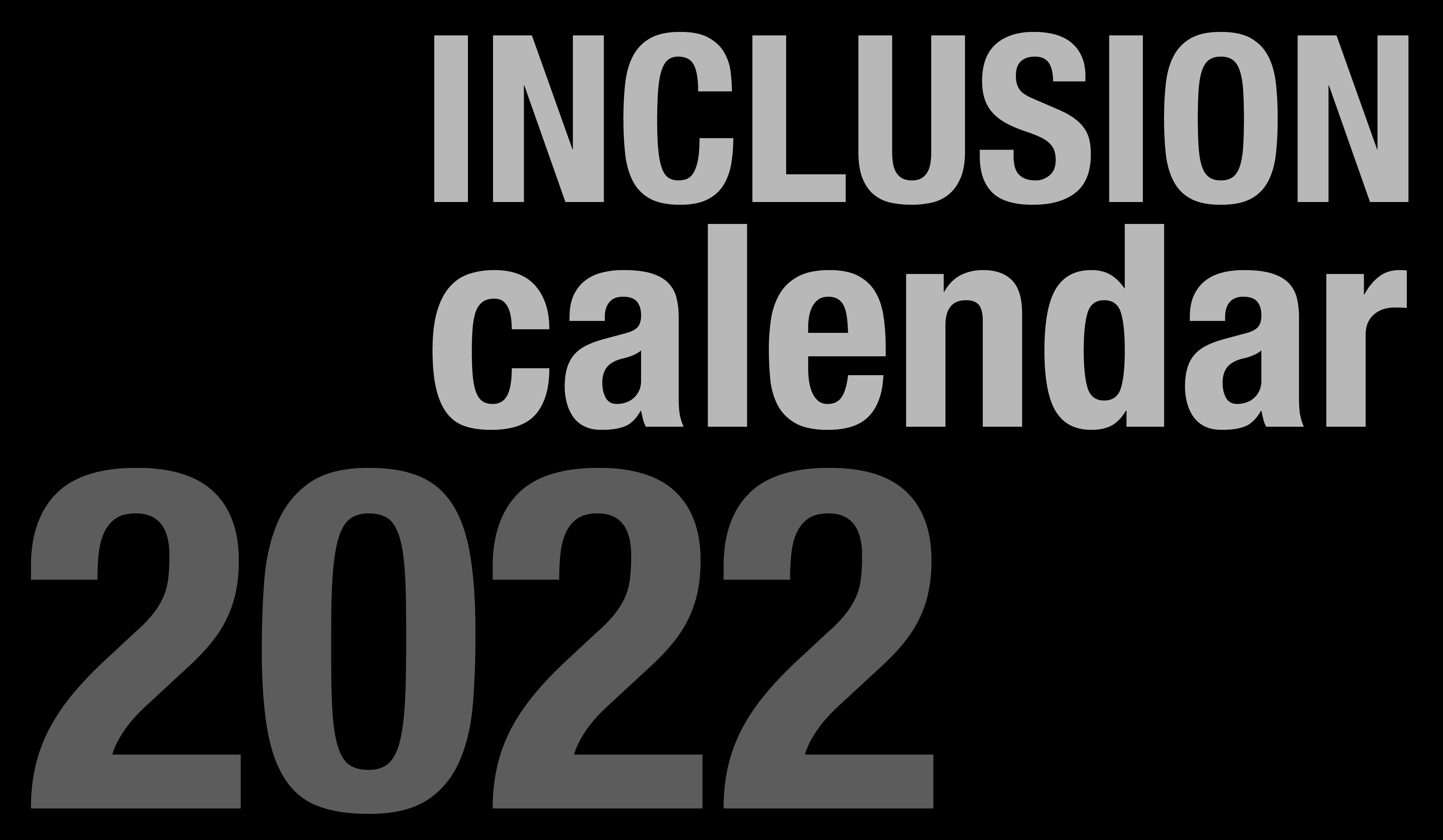Islamophobia awareness day
Disability History Month (18 November to 20 December)
Islamophobia Awareness Month highlights the threat of Islamophobic hate crimes and showcases the positive contributions of British Muslims to society.
UK Disability History Month (UKDHM) is an annual event creating a platform to focus on the history of the struggle for equality and human rights for people with disabilities. First running in 2010, DHM has become a huge success, organising events, providing resources and giving a voice to anyone across the UK who has a disability or is differently abled.
Get involved…
Have a read of Sofia Akel’s report on Islamophobia in Higher Education or get in contact with our Disabilities and Dyslexia Service (DDS) and our Staff DisAbility Network [login required].
Key dates in November 2022
All Saints' Day, also called All Hallows' Day, Hallowmas, or Feast of All Saints, in the Christian church, a day commemorating all the saints of the church, both known and unknown, who have attained heaven. In Roman Catholicism, the feast is usually a holy day of obligation.
Coronation of Emperor Haile Selassie I (Rastafari) – the Coronation of Emperor Haile Selassie I is one of the holiest days of the Rastafarian year. It celebrates Haile Selassie’s accession to the Ethiopian throne, and cements the role Ethiopia plays at the heart of Rastafarian tradition.
Birthday of Guru Nanak Dev (Sikh) – Guru Nanak's Birthday is a celebration in Sikhism, an independent faith that developed during the fifteenth century in India. The word Sikh comes from the Sanskrit word shishya, which means disciple or student. Sikhs believe that God was the original guru (guru means divinely inspired prophet or teacher) and that he chose to reveal his message to Guru Nanak, the first Sikh guru. Sikhs believe that their gurus were prophets sent by God to lead people into truth. They emphasise equality among people of different castes, practice Kirat Karni (a doctrine of labouring), and follow the precepts of charity.
Intersex Day of Remembrance, also known as Intersex Solidarity Day, is an internationally observed civil awareness day designed to highlight issues faced by intersex people.
Intersex Day of Remembrance takes place on 8 November. The day marks the birthday of Herculine Barbin, a French intersex person whose memoirs were later published by the philosopher Michel Foucault, along with contemporary texts and a later fictionalised account. Intersex Solidarity day is used to bring awareness to the issues faced by Intersex people and remember those Intersex people who we have lost along the way.
Dedication of the Lateran Basilica (Catholic Christian) – dedication of the Lateran Basilica is when the Church celebrates the feast of the Dedication of the Lateran Basilica in Rome, the oldest and highest ranking of the four major basilicas in Rome. The Basilica of St. John Lateran is the cathedral of the diocese of Rome, the official ecclesiastical seat of the Holy Father, the Bishop of Rome, not St. Peter's Basilica as so many mistakenly believe. The Basilica is also called the Church of Holy Savior or the Church of St. John Baptist.
The building of the Lateran Basilica not only gave the Christians of Rome an exclusive place for worship, but architecturally equalled or exceeded any of the monuments previously raised to the pagan gods. This was a momentous period, not only in Rome, but in both the history of the world and the history of Christianity.
Armistice Day (Interfaith) – Remembrance Day is a memorial day observed by Canadians and other members of the Commonwealth since the end of the First World War in order to remember all those who have fought and died in the line of duty to keep us free.
It was originally called “Armistice Day” to commemorate the armistice agreement that ended the First World War on Monday 11 November 1918, at 11 am – on the eleventh hour of the eleventh day of the eleventh month.
There are ceremonies at war memorials, cenotaphs and churches throughout the country, as well as abroad. Members of the Royal Family and politicians attend memorial services. The anniversary is used to remember all the people who have died in wars – not just World War One.
Remembrance Sunday in the United Kingdom is a holiday held on the second Sunday of November that commemorates British service members who have died in wars and other military conflicts since the onset of the First World War.
World Kindness Day is a global day that promotes the importance of being kind to each other, to yourself and to the world. The purpose of this day, celebrated on 13 November each year, is to help everyone understand that compassion for others is what binds us all together. This understanding has the power to bridge the gap between nations
UK Inter Faith Week – each year, Inter Faith Week begins on Remembrance Sunday, and runs until the following Sunday. It is hoped that the additional Sunday provides the opportunity for other weekend events to take place as well as those linked to Remembrance Sunday. Remembrance Sunday was chosen as a start day to encourage people to remember together the contributions of all faiths and none, and to consider how best to create a just, peaceful and harmonious world.
Transgender Awareness Week – each year between 13 – 19 November, people and organisations around the country participate in Transgender Awareness Week to help raise the visibility about transgender people and address issues members of the community face. Transgender Awareness Week is a week when transgender people and their allies take action to bring attention to the community by educating the public about who transgender people are, sharing stories and experiences, and advancing advocacy around the issues of prejudice, discrimination and violence that affect the transgender community.
Nativity Fast begins (Orthodox Christian) – in Christianity, the Nativity Fast is a period of abstinence and penance practiced by the Eastern Orthodox Church, Oriental Orthodox Church and Catholic Church in preparation for the Nativity of Jesus on 25 December. The Nativity Fast is one of four main fast periods throughout the ecclesiastical year. For preparation, the Church asks the faithful to participate in a fast by abstaining from certain food and drink, particularly from meat, fish, dairy products, olive oil and wine, as well as focusing more deeply on prayer and almsgiving.
The fast usually involves abstaining from certain foods. Eggs, dairy, poultry, red meat, meat products, oil, fish and wine are all abstained from. However, some of these foods are allowed at certain times for most fasters.
International Students’ Day – the date of 17 November was chosen to be the International Students' Day due to the events that unfolded in Prague during World War II. Nine students were executed without trial in concentration camps on 17 November 1939. Nowadays, 17 November marks a celebration of multiculturalism of international students.
International STAND UP to Bullying Day is a special semi-annual event in which participants sign and wear a pink "pledge shirt" to take a visible, public stance against bullying.
Bullying is defined as unwanted, aggressive behaviour that involves a real or perceived power imbalance. Another core element of bullying is the high likelihood of repeated bullying behaviours. Bullying doesn't just affect the person on the receiving end. This kind of behaviour affects the bullies themselves, as well as those who witness it. Bullying is especially common among school-aged children.
International Men’s Day raises awareness of the mental health issues guys face, challenge harmful stereotypes about masculinity and support the wellbeing of the men in your life.
Transgender Day of Remembrance (TDOR), is an annual observance on 20 November that honours the memory of the transgender people whose lives were lost in acts of anti-transgender violence that year. 2021 marked the most deadly year recorded, with at least 45 transgender people, most of them Black or Latinx, killed.
Guru Tegh Bahadur Martyrdom Day is observed every year on 24 November. He was the ninth of ten Gurus of the Sikh religion. He is revered as Hind ki Chadar by the Sikhs and also called Srisht-di-Chadar, or Shield of India.
People across the country pay their homage to the ninth of ten Sikh Gurus, who was a fierce supporter of religious freedom, on this day. The day marks the death anniversary of the ninth Sikh Guru.
This was an extremely important event in Sikh history that had a profound impact on the future direction of Sikhism, the religion of the Sikhs.
Guru Tegh Bahadar, the ninth Sikh Guru, undertook the supreme sacrifice for the protection of the most fundamental of human rights – the right of a person to freely practice his or her religion without interference or hindrance.
International Day for the Elimination of Violence against Women – the premise of the day is to raise awareness of the fact that women around the world are subject to rape, domestic violence and other forms of violence. Furthermore, one of the aims of the day is to highlight that the scale and true nature of the issue is often hidden.
Advent Sunday (Christian) – Advent is a season of the liturgical year observed in most Christian denominations as a time of expectant waiting and preparation for both the celebration of the Nativity of Christ at Christmas and the return of Christ at the Second Coming. Advent is the beginning of the liturgical year in Western Christianity, and is part of the wider Christmas and holiday season.
This is not an exhaustive list; please complete our inclusion calendar form if you'd like us to add your event or if there is anything missing from our dates.
This calendar is managed by the Centre for Equity and Inclusion and the Inclusive Calendar Stakeholders (ICS). The ICS group meets every month to discuss the month of events ahead, enhancement of the process and the calendar.
If you have any questions, please feel free to email us at equity@londonmet.ac.uk


